Lychees (or Litchi fruits) are not only nature’s candies used in Thai food recipes, delicacies, and desserts! The tropical fruit is an incredibly healthy and nutritious food – a superfood! Or a superfruit! Lychees have countless beneficial effects on human health and are traditionally used in ethnobotanical medicine. The extraordinary benefits of tropical fruits can be attributed to the fact that they are evolutionary foods for humans. Let’s explore what science and experience teaches us…
What are Superfruits?
Lychee is a superfruit, and its benefits will leave you stunned. But let’s be clear: all edible tropical fruits are slowly being discovered as true superfoods for humans, so the term “superfruits” is being birthed into existence.
Why tropical fruits? The reason tropical fruits are so healthy lies in our evolutionary history and, therefore, in human ecology. Like all apes, humans are frugivores, species specialized in foraging and eating fruit. A diet deficient in fruit is one of the main risk factors for poor health and increased mortality (Falcomer et al., 2019). While all fruits are beneficial for human health, tropical fruits are a category on their own, with the potential to boost health to another level if consumed in abundance. Why tropical fruits? Because humans originated in tropical forests, and our ancestors are highly frugivorous, which makes tropical fruits our most important evolutionary food source! An example to illustrate the evolutionary match is the fatty acid composition in tropical fruits compared to other fruits: tropical fruits contain the perfect ratio of omega-3 to 6, while most fruits from colder climates do not – because they have evolved as food sources for birds, not primates or other mammals.
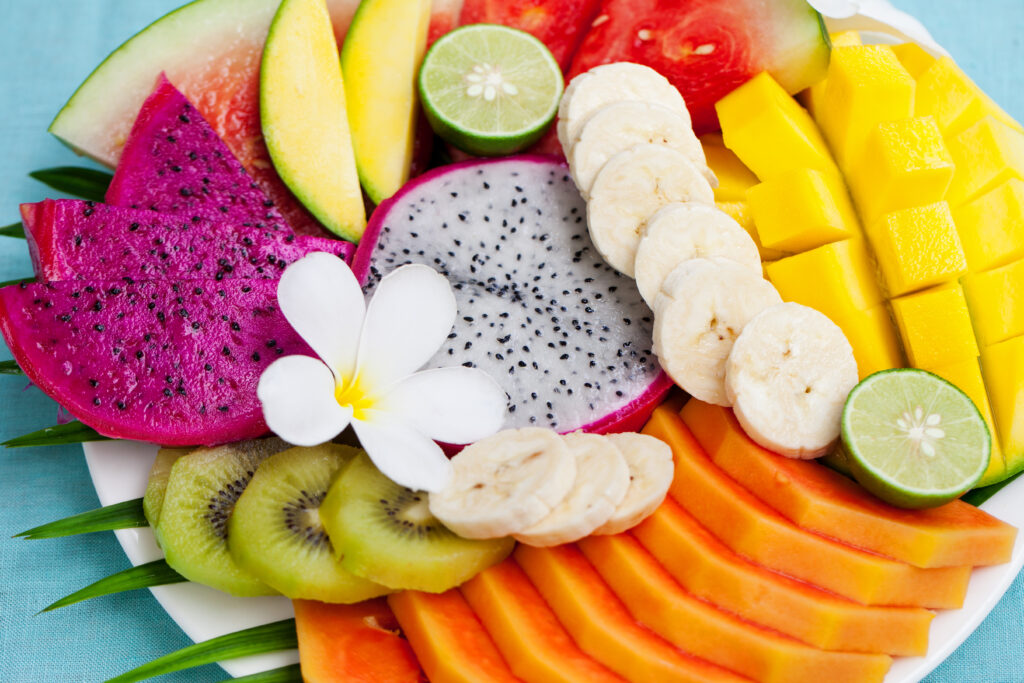
This is why eating tropical fruits in their raw, unaltered state is so delicious. Our taste buds do not lie, as they have evolved to indicate to us in nature what’s food and what’s not. Every animal in nature instinctively knows what is edible. We know it, too, if we do not let cultural filters bias our perception. Besides instincts, many more adaptations strongly suggest that humans are frugivores!
It’s not surprising that people living in the tropics are aware of the power of their fruits. They are not only occasionally used as home remedies but have a long history of medicinal uses. So, how come we still see health problems in tropical regions? Because many tropical countries do not base their traditional dishes on fruits but are often heavy in animal foods, legumes, and grains. Consuming abundant tropical fruits is the key to the myriad of health benefits, not only as an additional treat or dessert (which, of course, is better than nothing!).
Besides countless reports of people adopting a diet high in fruits to boost their health, we find a growing number of studies and evidence showing the health benefits of the beautiful fruits from the tropic paradise! In fact, there is no shortage of scientific evidence backing up what tropical indigenous people have long known!
“Tropical and subtropical fruits may be considered as a very important source of nutrients and bioactive compounds, mainly flavonoids and non-flavonoid phenolics.”
Sayago-Ayerdi et al., 2021
“These bioactive compounds (from tropical fruits) have been shown to possess various in vitro and in vivo biological activities, including antioxidant, antimicrobial, antiviral, anti-inflammatory, anti-aging, neuroprotective, and among others. Therefore, obtaining functional ingredients from tropical fruits considered exotic is viable and used to develop functional and nutraceutical foods, prepare products for the pharmaceutical industry…”
Enriquez-Valencia et al. (2020)
“The term “superfruit” has gained increasing usage and attention recently with the marketing strategy to promote the extraordinary health benefits of some exotic fruits…The phytochemicals from superfruits are bioaccessible and bioavailable in humans with promising health benefits.”
Chang et al., 2023
Just imagine what would happen if we make high-quality tropical fruits an substantial part of our diet!
Also, read our article on why temperate fruits cannot take the role of tropical fruits in our health!
What are superfoods, really?
Superfoods are commonly used to describe foods that are more nutrient-dense than “normal” foods, high in antioxidants or contain unique phytochemicals with proven health benefits. They are placed somewhere between food and medicine, which is a somewhat artificial distinction.
Not all so-called superfoods are actually superfoods! Unfortunately, many foods that are commonly referred to as superfoods (visit Harvard’s list or healthline.com’s list of superfoods) are not really the healthiest choice there is for humans. While they are nutrient-dense and provide benefits, many of those foods also contain high levels of anti-nutrients! Sally. K . Norton has dedicated a whole book (Toxic Superfoods) to the subject. Most superfoods are foods that have not been cultivated and altered as much as other common foods. This has its benefits – but also its downside: Selective breeding ensures that the harsh self-protective compounds that plants evolve towards animals are minimized. Many superfoods are foods we have not evolved to eat; thus, their harsh compounds can be tough on us. The solution is to eat nutrient-dense foods that we have actually evolved with:
True superfoods are the evolutionary food sources of humans in nature. Superfoods are species-specific foods, the foods we prefer in nature, raw, unaltered, and unprocessed foods – in the case of apes, the main evolutionary foods are fruits, nuts, and greens that are native to the tropics. These are our true superfoods, while herbs and medicinal plants are medicine.
This explains why tropical fruits are being discovered as the key to human health! Let’s start with lychee:
Superfruit lychee – Litchi chinensis
Lychee is one of the most delicious fruits known for its sweetness and exotic perfume flavor. Lychee botanically is a drupe and a nut fruit that belongs to the soapberry fruits native to Southeast Asia, which also includes rambutan and longan.
Wild lychees were cultivated multiple times in the past and selected for flowering times.
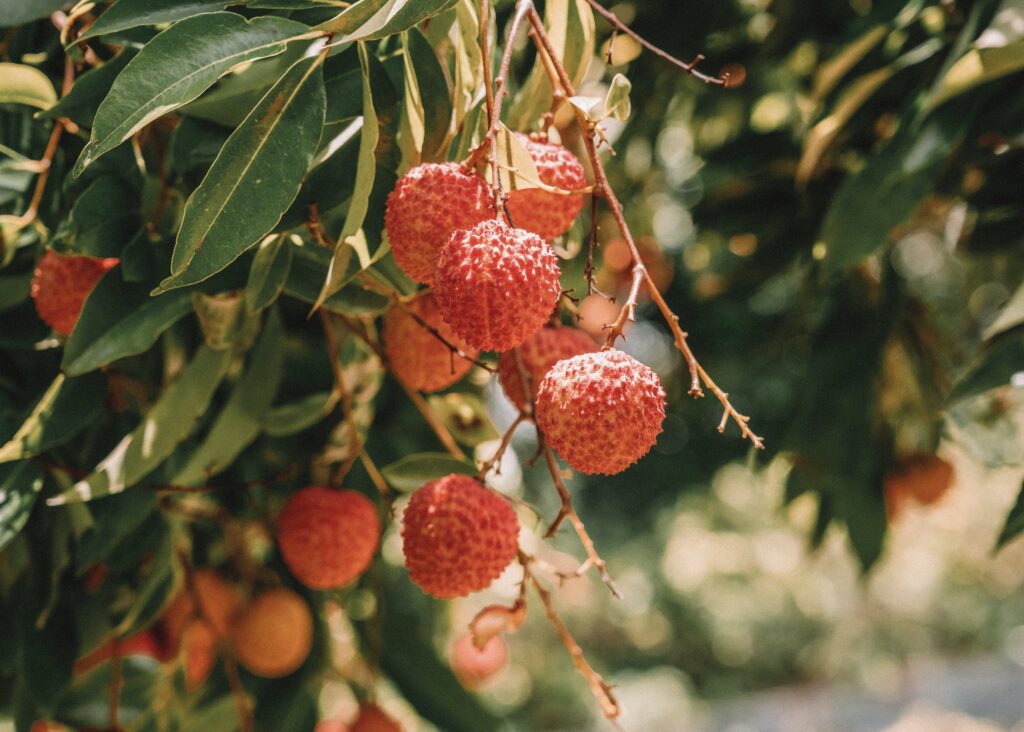
When you eat sweet lychees, you will realize that you are indeed a frugivore by nature! And, on top of the taste, the fruits and other parts of Litchi chinensis offer countless benefits for human health! Lychee is a highly nutrient-dense and energetic food. Lychees are particularly high in vitamin C, folate, and other B vitamins (except B12). Two handfuls of fruits can meet the official recommendations of vitamin C (although we actually need much more!).
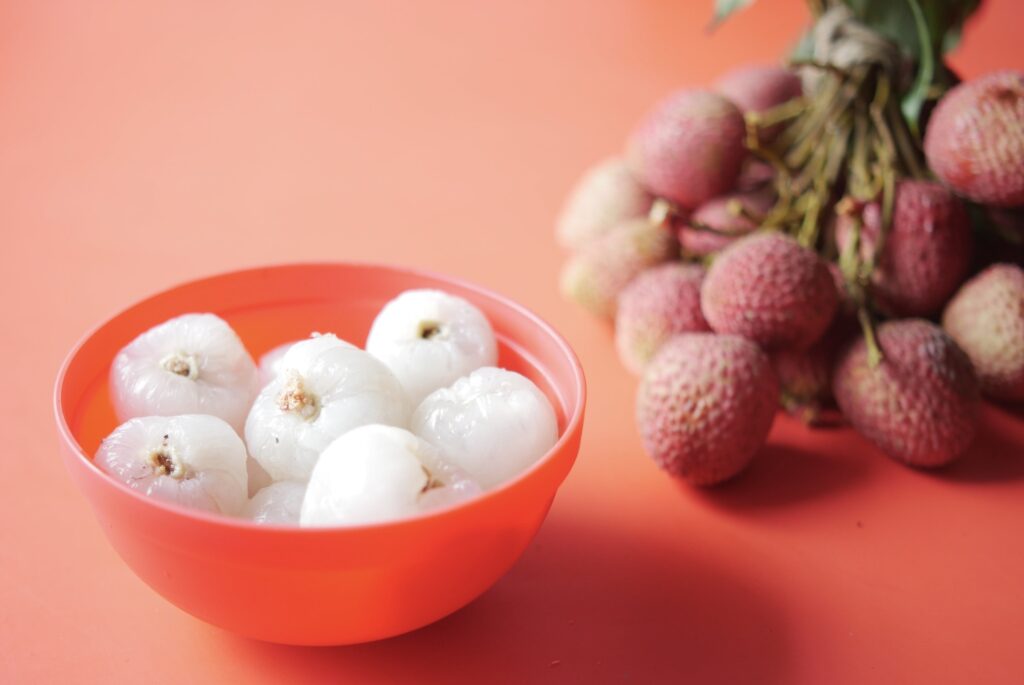
Besides nutrients, lychee contains a wealth of health-boosting, antioxidant phenolic compounds, including proanthocyanidins similar to berries and grapes. In one study, lychee had the second highest polyphenolic antioxidant effects (vitamin C excluded) of 24 types of fruits (of which most were temperate fruits, however). Lychee’s extraordinary polyphenolic power has even been used to create a health supplement called “oligonol” (see below).
Besides their health-boosting effects, polyphenols are also the molecules responsible for the flavor and aroma of the fruit! Lychee contains volatile compounds, which are both, healthy and appealing. In this case, our biological instincts don’t mislead us when eating tasty lychees – it tastes good, it is good!
Lychee’s oligonol: Get your medicine from nature, not a supplement!
The pharmacological interest in fruit-derived compounds is nothing new. In particular, wild exotic herbs and fruits are of great interest to developers of supplements and active ingredients for health products. Oligonol derived from lychee is one of those cases:
Oligonol is the marketed name of the polyphenolic compounds (including catechin and procyanidin) that is present in lychee pulp naturally, and has been shown to have favorable effects on diabetes. It is patented as a supplement, in which the mixture is derived from lychee but in a slightly altered composition. The supplement is used for health and beauty and has been studied for other more serious conditions and anti-viral properties. Here is what researchers found about the derived oligonol:
“…oligonol, a low-molecular-weight polyphenol treatment, was able to improve diabetic indices, prevent the development of diabetic renal disease, and preserve renal cells and renal morphologic structure…”
Park et al. (2014)
If the health industry knows about the power of lychee and copies it, we might just get its health-boosting power straight from nature in its natural composition! No wonder lychee has been used in traditional medicine in China and India for hundreds of years:
“Litchi chinensis… The parts of the plant used are leaves, flowers, fruits, seed, pulp, and pericarp. All parts of the plant are rich sources of phytochemicals––epicatechin; procyanidin A2 and procyanidin B2; leucocyanidin; cyanidin glycoside, malvidin glycoside, and saponins; butylated hydroxytoluene; isolariciresinol; kaempferol; rutin; and stigmasterol. “
Kilari & Putta (2016)
Let’s summarize the amazing benefits that were researched in the last decades:
Health benefits of lychees
Some of the health benefits of lychee (the fruit itself) that have been shown in scientific studies are:
- Lychees have anti-diabetic effects.
- Lychees contain high levels of antioxidants.
- Lychees are anti-inflammatory.
- Lychees have liver-protective effects.
- Lychees have kidney-protective effects.
- Lychees show anti-tumor activities.
- Lychees have anti-viral effects.
- Lychees help balance the microbiome.
Traditional uses:
“Lychee poisoning”: It’s the pesticides, not the fruits!
In the last decade, there have been repeated reports about local “poisoning outbreaks” of children in India due to consuming lychees. The unripe lychees contain the same toxin as the unripe ackee, which causes the infamous “Jamaican vomiting sickness.” However, in the case of lychees, it is not entirely determined whether the toxic effects are really due to pesticides or the natural toxic fruit compounds themselves:
While most unripe fruits are “only” unpalatable, lychee (and some other fruits) have taken its chemical self-defense to the next level and can result in severe poisoning. Unripe fruits are protected from being eaten by the plant with a chemical defense as they prevent their immature seed from being dispersed too early. In the case of lychee, it contains compounds (hypoglycin A and MCPG) that drop blood sugar levels and can be dangerous, especially in undernourished children or in people who haven’t eaten in a while (or while fasting) (source). The antidote to the blood sugar drop is simple sugar.
While it was first argued by scientists that the toxicity of unripe lychee is the cause of the poisoning outbreaks, the journal Nature concluded in an article called “Litchi deaths – the enigma continues” that the poisoning episodes were not due to the lychee fruit itself but due to highly toxic pesticides used in their production. So…
Is lychee poisoning a concern? It’s probably the pesticides, not the lychee fruits! Due to the confusion, recent research has addressed the question and found that – possibly – both factors should be counted into the equation: MCPG in unripe lychee and pesticides. The study indeed found highly toxic pesticide residues in the urine of the affected children but also emphasized that we cannot ignore that the compound MCPG is naturally present in unripe lychees, which can affect malnourished children. However, the large quantity of lychees humans can safely consume per day indicates that lychees are generally a safe and healthy fruit – given the fruits are ripe and not contaminated with toxic pesticides!
How much lychee can we consume safely? The researchers suggest around 4 kg of litchi pulp/day for adults and 0.5-1 kg of pulp/day for small children up to 5 years.
Please expand to see the references used to summarize the health benefits of lychees:
- C. Hsu, Lychee Genome tells a colorful story about a colorful tropical fruit (2022) University at Buffalo. Available at: https://www.buffalo.edu/news/releases/2022/01/002.html#:~:text=The%20research%20shows%20that%20the,two%20locations%2C%20the%20analysis%20suggests. (Accessed: 07 December 2023).
- Lv, Q. et al. (2015) ‘Identification of proanthocyanidins from Litchi (litchi chinensis Sonn.) pulp by LC-esi-Q-TOF-MS and their antioxidant activity’, PLOS ONE, 10(3). doi:10.1371/journal.pone.0120480.
- Brat, P. et al. (2006) ‘Daily polyphenol intake in France from fruit and vegetables’, The Journal of Nutrition, 136(9), pp. 2368–2373. doi:10.1093/jn/136.9.2368.
- Park, C.H., Yokozawa, T. and Noh, J.S. (2014) ‘Oligonol, a low-molecular-weight polyphenol derived from lychee fruit, attenuates diabetes-induced renal damage through the advanced glycation end product–related pathway in DB/DB mice’, The Journal of Nutrition, 144(8), pp. 1150–1157. doi:10.3945/jn.114.193961.
- Bahijri, S.M. et al. (2018) ‘Supplementation with oligonol, prevents weight gain and improves lipid profile in overweight and obese Saudi females’, Current Nutrition & Food Science, 14(2), pp. 164–170. doi:10.2174/1573401313666170609101408.
- Kilari, E. and Putta, S. (2016) ‘Biological and phytopharmacological descriptions of Litchi chinensis’, Pharmacognosy Reviews, 10(19), p. 60. doi:10.4103/0973-7847.176548.
- Sun, W. et al. (2021) ‘Lychee (litchi chinensis Sonn.), the king of fruits, with both traditional and modern pharmacological health benefits’, Pharmacognosy Communications, 11(1), pp. 22–25. doi:10.5530/pc.2021.1.5.
- Emanuele, S. et al. (2017) ‘Litchi chinensis as a functional food and a source of antitumor compounds: An overview and a description of biochemical pathways’, Nutrients, 9(9), p. 992. doi:10.3390/nu9090992.
- Choi, J.S. et al. (2016) ‘Inhibitory evaluation of oligonol on α-glucosidase, protein tyrosine phosphatase 1B, cholinesterase, and β-secretase 1 related to diabetes and alzheimer’s disease’, Archives of Pharmacal Research, 39(3), pp. 409–420. doi:10.1007/s12272-015-0682-8.
- Jinato T, Chayanupatkul M, Dissayabutra T, Chutaputti A, Tangkijvanich P, Chuaypen N. Litchi-Derived Polyphenol Alleviates Liver Steatosis and Gut Dysbiosis in Patients with Non-Alcoholic Fatty Liver Disease: A Randomized Double-Blinded, Placebo-Controlled Study. Nutrients. 2022 Jul 16;14(14):2921. doi: 10.3390/nu14142921. PMID: 35889878; PMCID: PMC9319370.
- Ibrahim SR, Mohamed GA. Litchi chinensis: medicinal uses, phytochemistry, and pharmacology. J Ethnopharmacol. 2015 Nov 4;174:492-513. doi: 10.1016/j.jep.2015.08.054. Epub 2015 Sep 2. PMID: 26342518.
- At least 31 children in India killed by toxin in lychees (2019) The Guardian. Available at: https://www.theguardian.com/world/2019/jun/13/at-least-31-children-in-india-killed-by-toxin-in-lychees (Accessed: 07 December 2023).
- Senthilingam, M. (2017) Natural-born killers: The Fruits and veggies that could poison you, CNN. Available at: https://edition.cnn.com/2017/04/10/health/fruits-poison-litchee-ackee-nerve-disease/index.html (Accessed: 07 December 2023).
- S. Jayaraman, K. (2017) Litchi deaths – the Enigma continues, Nature News. Available at: https://www.nature.com/articles/nindia.2017.88 (Accessed: 07 December 2023).
- Sinha SN, Ramakrishna UV, Sinha PK, Thakur CP. A recurring disease outbreak following litchi fruit consumption among children in Muzaffarpur, Bihar-A comprehensive investigation on factors of toxicity. PLoS One. 2020 Dec 31;15(12):e0244798. doi: 10.1371/journal.pone.0244798. PMID: 33382820; PMCID: PMC7774918.
Let tropical fruits be thy medicine
This Superfruit series intends to show that tropical fruits are more than just a pleasant treat or dessert but build the very foundation of the natural nutrition of apes, including humans. This is reflected in the biochemical miracles that we find in fruits, which are highly beneficial and even medicinal. The compounds found in these fruits have co-evolved in a mutualistic dynamic with primates as their seed-disperser. The result is a fountain of nutrition and secondary plant metabolites biologically matched to the frugivore.
While commercialized tropical fruits have medicinal properties, many wild and underutilized fruits in tropical forests have been used as medicine by locals. Those fruits hold powerful potential to be used as medicine!
“Southeast Asian countries, including Malaysia, have tropical rainforests with a variety of fruit-bearing trees. These trees are evergreen and growing throughout the year. Many of these trees produce edible fruit for animals living within the scrubs and some of these fruits are even used by the local communities in their traditional medicine… ambarella (Spondias dulcis L.), cempedak (Artocarpus integer [Thunb.] Merr.), langsat (Lansium domesticumCorrêa), pulasan (Nephelium mutabile Blume), and salak (Salacca zalacca [Gaertn.] Voss), whereas bambangan (Mangifera pajang Kosterm.), dabai (Canarium odontophyllum Miq.), durian nyekak (Durio kutejensis Hassk. & Becc.), and some wild bananas (Musa spp.) are found mainly in the Borneo market because they are native to Borneo Island. However, some of these fruits are still collected from their wildly grown trees, and their potential medicinal properties are not well understood.”
Hock Eng Khoo et al. (2016)
Knowing our evolutionary past with tropical fruits and the plethora of beneficial biochemicals in those naturally appealing and delicious foods takes “let food be thy medicine and medicine be thy food” to another level! And I can confidently say that we should add a slightly altered version to this wisdom:
“Let tropical fruits be thy food and medicine!”
Martina Spaeni Lima
Portraying the benefits of lychees is part of the growing Superfruit series dedicated to uncovering the stunning chemical compounds in tropical fruits and their effects on health:
- Açai
- Acerola
- Avocado
- Bananas
- Breadfruit
- Mangosteen
- Custard Apple
- Guava
- Durian
- Tropical Figs
- Rambutan
- Lychee
- Dragonfruit
- Papaya
- Mango
- Passionfruit
- Granadilla
- Soursop
- Starfruit
Other References
- Chang, S.K., Alasalvar, C. and Shahidi, F. (2018) ‘Superfruits: Phytochemicals, antioxidant efficacies, and health effects – A comprehensive review’, Critical Reviews in Food Science and Nutrition, 59(10), pp. 1580–1604. doi:10.1080/10408398.2017.1422111.
- Falcomer AL, Riquette RFR, de Lima BR, Ginani VC, Zandonadi RP. Health Benefits of Green Banana Consumption: A Systematic Review. Nutrients. 2019 May 29;11(6):1222. doi: 10.3390/nu11061222. PMID: 31146437; PMCID: PMC6627159.
- Ganguli, Barin & Narkhede, Satish & Haldankar, Parag & Bhattacharyya, Tapas. (2019). Abstract Wild Mangoes -An Incredible Wealth for Posterity. 15. 1258-1264.
- Hill, A. (2023) 16 superfoods that are worthy of the title, Healthline. Available at: https://www.healthline.com/nutrition/true-superfoods#TOC_TITLE_HDR_12 (Accessed: 16 November 2023).
- Katherine D. McManus, M. (2022) 10 superfoods to boost a healthy diet, Harvard Health. Available at: https://www.health.harvard.edu/blog/10-superfoods-to-boost-a-healthy-diet-2018082914463 (Accessed: 16 November 2023).
- Toxic superfoods, by Sally K. Norton, mph (2023) Sally K. Norton. Available at: https://sallyknorton.com/toxic_superfoods/ (Accessed: 16 November 2023).
- S. Sayago-Ayerdi, D. L. García-Martínez, A. C. Ramírez-Castillo, H. R. Ramírez-Concepción, M. Viuda-Martos, (2021) Tropical fruits and their co-products as bioactive compounds and their health effects: A Review. Foods. 10, 1952
- Enriquez-Valencia, S. et al. (2020) ‘Propiedades Bioactivas de Frutas Tropicales Exóticas y Sus Beneficios a la salud’, Archivos Latinoamericanos de Nutrición, 70(3), pp. 205–214. doi:10.37527/2020.70.3.006.
- Gunter, N.V. et al. (2020) ‘Natural xanthones and skin inflammatory diseases: Multitargeting mechanisms of action and potential application’, Frontiers in Pharmacology, 11. doi:10.3389/fphar.2020.594202.
- Khoo HE, Azlan A, Kong KW, Ismail A. Phytochemicals and Medicinal Properties of Indigenous Tropical Fruits with Potential for Commercial Development. Evid Based Complement Alternat Med. 2016;2016:7591951. doi: 10.1155/2016/7591951. Epub 2016 May 31. PMID: 27340420; PMCID: PMC4906201.


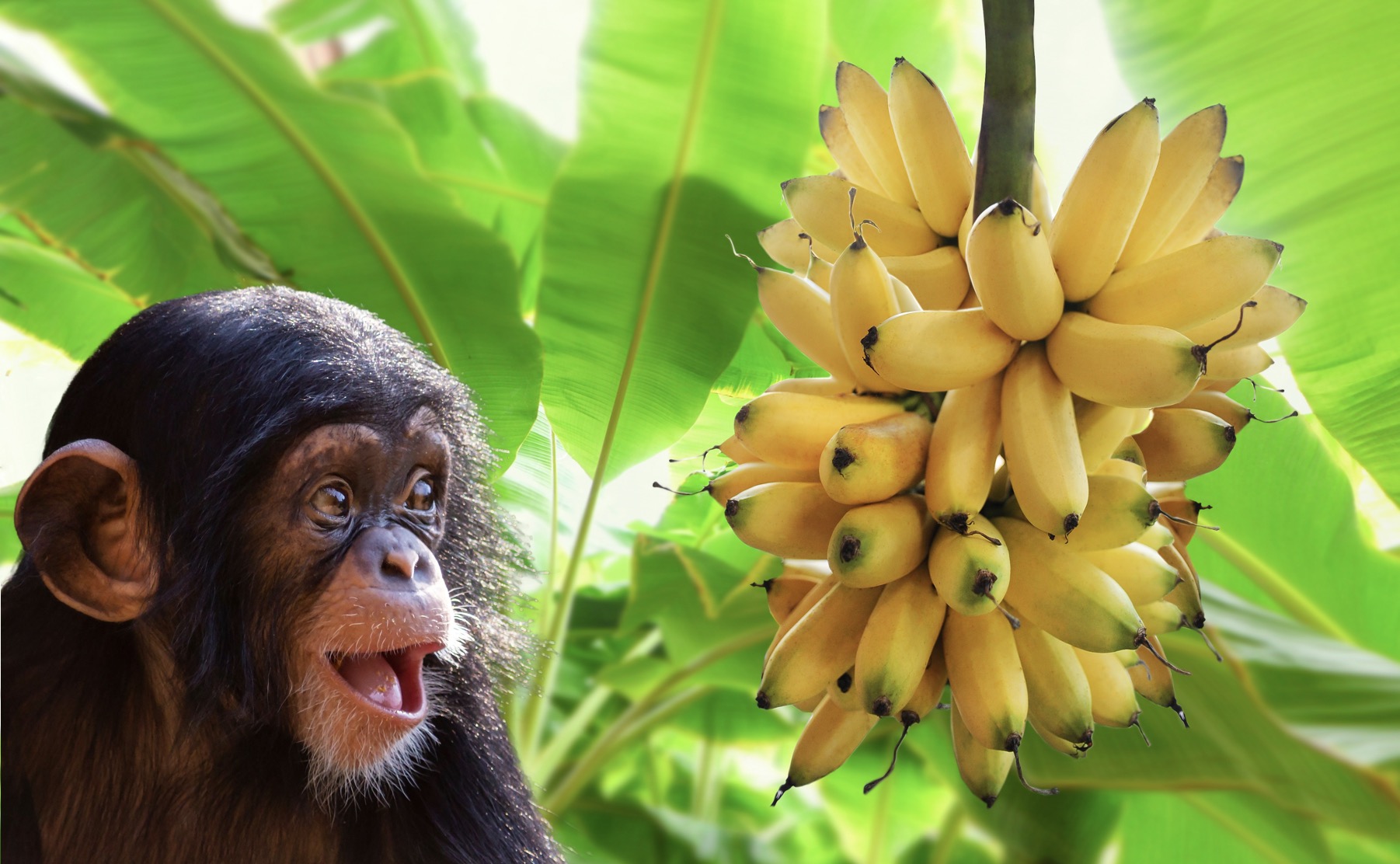
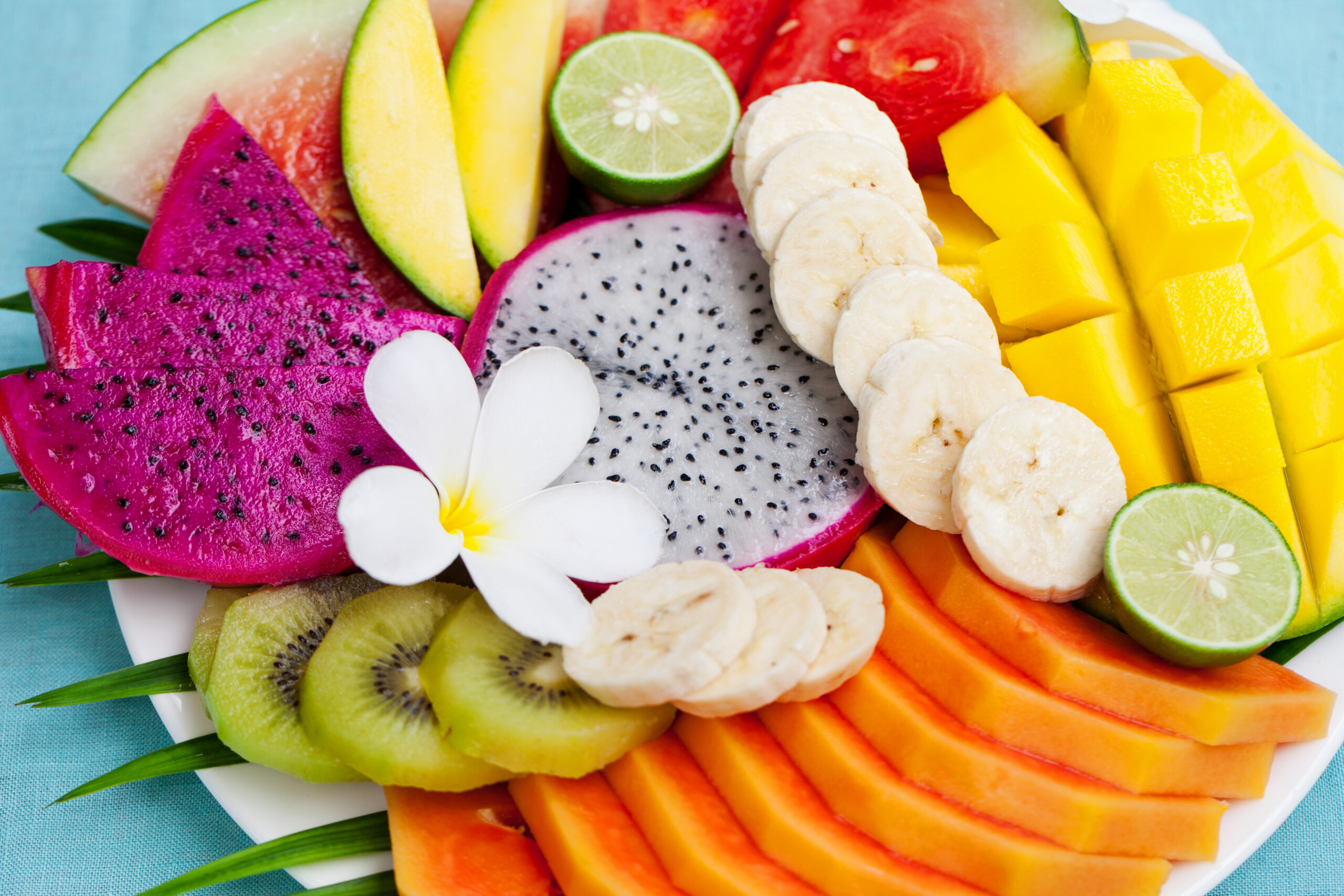
Add Comment